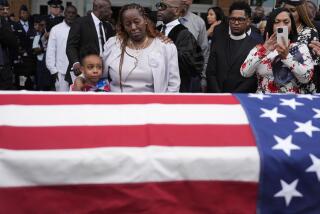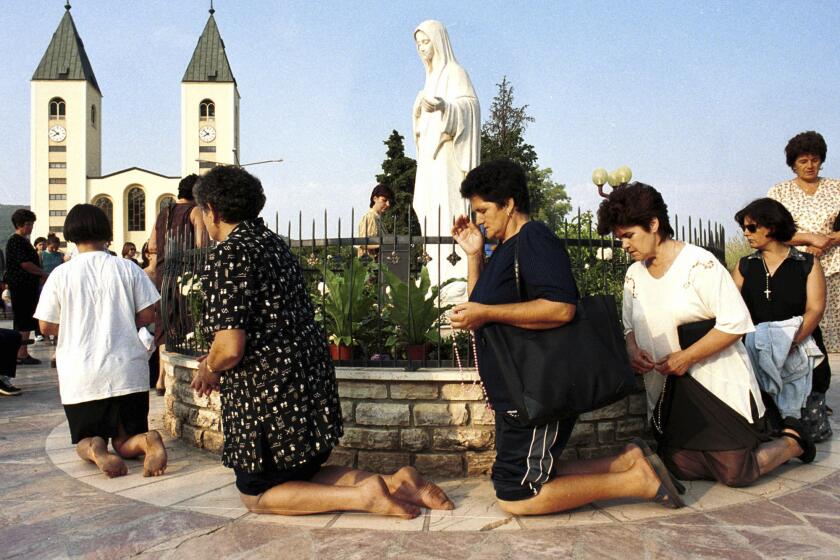Iraq’s Prime Minister Set to Present Cabinet Picks
Prime Minister-designate Nouri Maliki is planning to present his new government to Iraq’s Council of Representatives on Saturday and to formalize his ministry appointments by Monday, U.S. and Iraqi sources said Wednesday.
A day after announcing that Iraq’s contentious political parties had agreed on the distribution of Cabinet posts, Iraqi politicians appeared to be coalescing around the names of several prominent candidates, the final step in the long-delayed formation of a government after parliamentary elections in December.
One key post, the Interior Ministry, is expected to go to Ahmed Chalabi, who currently is the Oil minister.
Chalabi, who would replace Bayan Jabr, briefly led the Governing Council in 2003 and was a key U.S. ally until the Bush administration accused him in 2004 of selling state secrets to Iran. His name was further tarnished when one of his top lieutenants, code-named “Curveball” by U.S. intelligence agencies, was found to have fed them hundreds of pages of bogus information about mobile biological weapons systems.
Hussein Shahristani, a nuclear physicist who ran as an independent, appears set to be named Oil minister.
“He had struggled against the previous regime and he risked his life more than once,” said Adnan Ubaidi, editor in chief of Al Istiqamah newspaper, published by the Supreme Council for Islamic Revolution in Iraq, or SCIRI, the leading political party in the main Shiite bloc.
“He is a patriotic Iraqi known for his honesty and integrity and good reputation,” Ubaidi said. “He is also an independent, so I think he is theoretically the most qualified man for the Oil Ministry.”
Jabr, also a member of the Shiite bloc, is a candidate for the Finance Ministry. Sunni Arabs had accused Jabr of allowing Shiite militias and death squads to proliferate among the Interior Ministry’s forces and vehemently opposed Maliki’s efforts to have him retain his post. Ubaidi, a longtime associate, said Jabr was one of the main sticking points during the months of negotiations.
National security advisor Mowaffak Rubaie, a moderate Shiite, and the former parliament speaker, Hachim Hassani, a moderate Sunni Arab, have been named as candidates for the Defense Ministry, said Ali Dabagh, a leader of Al Fadila al Islamiya, or the Islamic Virtue Party, also a member of the Shiite bloc.
Rubaie is also in the running for the Interior Ministry, said Amar Wajeeh, a Sunni Arab legislator.
“This all needs to be approved by different parties,” Dabagh said. “As of now, it is not yet finalized. It is a very sensitive situation.”
As politicians in Baghdad appeared to make progress, thousands of demonstrators took to the streets in the southern city of Basra on Wednesday in the wake of a series of killings that has led to calls for the governor’s ouster and deployment of Iraqi army forces within the city.
Officials from the Shiite oil hub said at least 20 police officers and dozens of civilians had been slain in recent days.
The killings have occurred amid increasing political tension in the city between SCIRI and Al Fadila, which holds the governor’s office and a slim majority on the governorate council.
This week, Al Fadila issued fliers accusing a prominent SCIRI politician and a representative of Grand Ayatollah Ali Sistani, Iraq’s preeminent Shiite cleric, of working with Iran and the Lebanese militant group Hezbollah to carry out attacks in Iraq.
Al Fadila itself has come under attack from local tribes who accuse Basra Gov. Mohammed Waeli of involvement in the assassination of a local chief. A group of men in police uniforms killed Sheik Hasan Jarih, head of the Karamisha tribe from the marsh areas north of Basra.
“This tribal leader has a bad reputation, and it seems he was invited by the governor,” said Hussein Adhab, a lawyer from Basra. “And while he was leaving [the meeting] he was killed, along with one of his followers. This tribe is known for its ferocity and power and held the governor responsible for the killing of their chief. They took it personally.”
On Tuesday, a band of armed Karamisha tribesmen attacked a Basra police station, British military spokesman Maj. Sebastian Muntz said. Basra officials said at least eight police officers died in the clash. The tribesmen left the station before British troops could respond.
According to the Arabic newspaper Al Zaman, tribesmen also burned down two buildings used by SCIRI.
On Wednesday, several political, tribal and religious organizations marched in the streets to demand the governor’s removal, which would require a two-thirds vote by the Basra governorate council.
British military officials criticized Waeli for attempting to dismiss the local police chief and the head of the local Iraqi army division.
“The immediate reaction from us is that we didn’t believe that he was empowered to do that,” said Muntz, who added that Waeli’s attempt caused “a certain amount of tension between us.”
Even members of the governor’s party appeared to be distancing themselves from him.
“The governor is trying to say something against the agents of Sistani,” said Dabagh, the Baghdad-based Al Fadila leader. He said the governor was speaking for himself when he criticized members of SCIRI and Sistani’s organization.
“He should not do anything wrong against people who are so respected and appreciated in Basra. The governor should refrain from any unhelpful declarations,” Dabagh said.
To quell the unrest in Basra, Baghdad’s central government has formed a task force led by Dabagh and Iraqi Vice President Adel Abdul Mehdi.
Iraqi troops have also been dispatched to Basra to calm the situation, Muntz said.
Violence continued elsewhere in Iraq with police reporting the discovery of eight bodies in six Baghdad neighborhoods. Gunmen killed four people in the capital, including a member of a Sunni Arab political party.
A Baghdad police source also said that U.S. troops killed one person. U.S. and Iraqi officials said they had no additional information about the incident.
*
Times staff writers Megan K. Stack, Shamil Aziz, Caesar Ahmed, Suhail Ahmad, Zainab Hussein and Saif Rasheed in Baghdad and special correspondents in Kirkuk and Baghdad contributed to this report.
More to Read
Start your day right
Sign up for Essential California for news, features and recommendations from the L.A. Times and beyond in your inbox six days a week.
You may occasionally receive promotional content from the Los Angeles Times.






